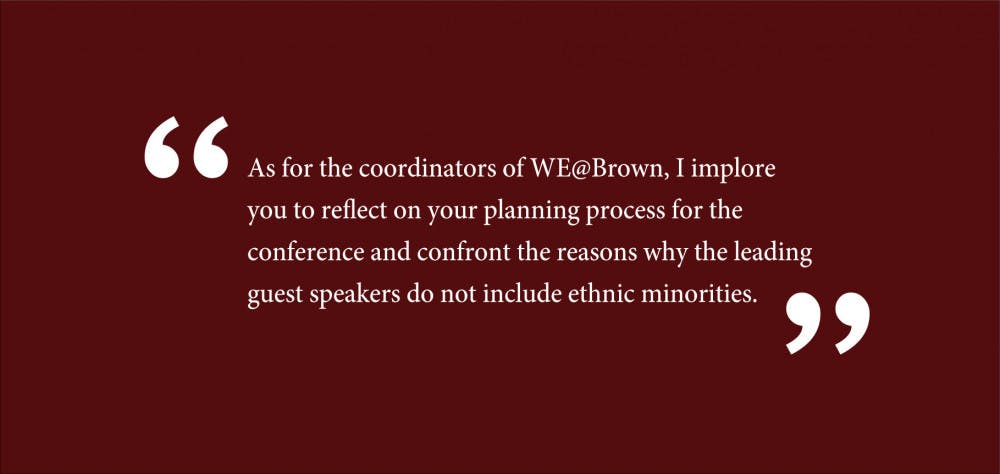From Feb. 7 until the Feb. 9, I had the pleasure of representing Brown at the 24th Annual Black Solidarity Conference sponsored by Yale. Hundreds of black undergraduate students gathered to attend workshops, network and foster connections with one another. During a moment of free time, I was scrolling through Facebook when I came across an advertisement for “WE@Brown,” a women’s empowerment conference to be held in Salomon Hall March 9. I was momentarily intrigued by another opportunity to be a part of a large group of undergraduates to celebrate our common identity.
However, as I learned more details about the conference, my burst of enthusiasm was replaced by growing wariness. The headlining speakers for the conference include three women who are each prominent business and entrepreneurial figures. Keynote speaker Lisa Caputo ’86 is the current executive vice president of marketing, communications and customer experience for Travelers. The opening remarks will be delivered by Haley Hoffman Smith ’18, author of “Her Big Idea.” The closing remarks will be delivered by Stephanie Kaplan Lewis, a graduate from Harvard and co-founder and CEO of Her Campus Media. As I stared at the photos of these speakers, I found it ironic that, while at a conference where I felt included and validated, I was reading about an event where all the leading speakers will be white.
At a historically white institution like Brown, the implicit racial bias that is apparent to me in the selection of speakers for WE@Brown did not surprise me. I was more so disappointed to see yet another example of the centralization of white womanhood in today’s feminist movement.
This past January, the organizers of a women’s march in Eureka, California canceled their Jan. 19 event due to concerns that the participants would be mostly white women, thus lacking crucial perspectives from female minority groups. The group did acknowledge on their Facebook page that the event had been planned in a way that focused on the perspectives of the majority white leadership, and so the group postponed their event so that minorities would have the opportunity to co-direct the march. The planned event has been rescheduled to March 2019. Going forward, the individuals organizing WE@Brown would do well to mimic this act of self-awareness.
There is an argument to be made that if women of color are excluded from the mainstream feminist movement, then it is best we create a movement of our own. Such is the origin of Womanism, a term that author Alice Walker first used in her book “In Search of Our Mothers’ Garden: Womanist Prose.” Walker describes Womanism as “another shade” of feminism, one that highlights the experiences of black women and women of color in general. Womanism arose from the dearth of minority representation in the feminist movements of the 19th and 20th centuries, when the middle-class white women who led the movements often neglected the nuanced forms of oppression that ethnic women suffered.
I am in full support of affinity spaces for ethnic minorities. Additionally, however, I argue that we cannot rely solely on these spaces to further diversity and inclusion efforts at Brown and elsewhere. Women of color must assert their rightful space in the mainstream feminist movement. If we do not insist on dismantling majority white spaces, those leading them will never be forced to reevaluate their narrow perception of successful women who deserve to be included in the mainstream. White women who are already included will continue to operate under the false impression that either the issue of race is solved by means of affinity spaces or that representation is not a pressing issue.
I know that we as women of color are all exhausted with spending our mental and emotional energy on making our white counterparts aware of racial bias. Therefore, I recommend that, only if we feel able, women of color should attend WE@Brown in large numbers. Attend the workshops and ask the industry leaders how well integrated women of color are in the workplace environments of their respective companies, not just numerically, but professionally and socially. Overall, I imagine that the optics of a crowd of women of color will force the coordinators to confront the diversity of women to whom they are accountable if their mission indeed is to empower women at large.
I do not mean to insult those speaking on the WE@Brown panel; they are impressive women who have every right to be there. I am mainly arguing that the event should expand to include women of color as leading speakers.
Therefore, for the coordinators of WE@Brown, I implore you to reflect on your planning process for the conference and confront the reasons why the leading guest speakers do not include ethnic minorities. Attending this event as a woman of color would not have to be so mentally and emotionally draining if the event appeared to be conscientious of women of all backgrounds. When you are planning WE@Brown for next year, do make a concerted effort to include more women of color as speakers and workshop facilitators in order for your conference to be more intersectional. Ultimately, you are responsible for redefining who exactly the “we” is in WE@Brown.
Jordan Allums ’21 can be reached at jordan_allums@brown.edu. Please send responses to this opinion to letters@browndailyherald.com and other op-eds to opinions@browndailyherald.com.





